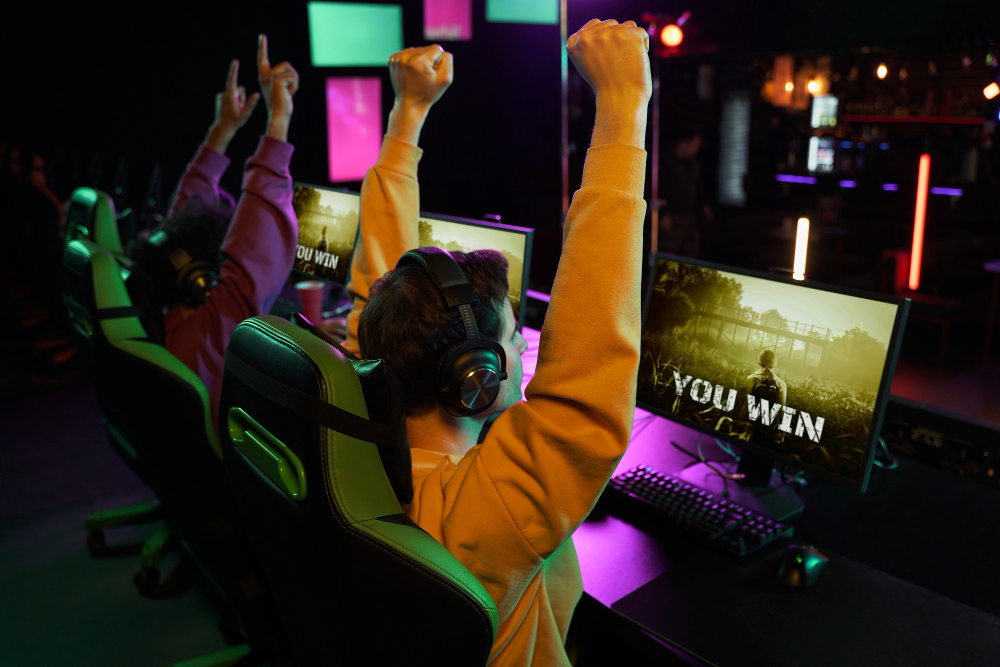Esports, once considered a niche hobby, has exploded into a global phenomenon, captivating millions of players and spectators around the world. With professional esports tournaments filling arenas, massive prize pools, and sponsorship deals from major brands, competitive gaming has become a lucrative industry with its own set of strategies for success. In this comprehensive guide, we’ll delve into the secrets of esports success in 2024, exploring the strategies, techniques, and mindset that separate the champions from the rest. Whether you’re an aspiring esports competitor, team manager, or fan, join us as we unlock the secrets of esports success and explore the dynamic world of competitive gaming.
The Rise of Esports: A Global Phenomenon
Understanding Esports
Esports, short for electronic sports, refers to competitive video gaming played at a professional level. Players compete individually or as part of a team in a variety of popular video games, including multiplayer online battle arena (MOBA) games like League of Legends and Dota 2, first-person shooters (FPS) like Counter-Strike: Global Offensive and Overwatch, and real-time strategy (RTS) games like StarCraft II. Esports tournaments attract millions of viewers online and in-person, with top players and teams competing for prestige, prize money, and sponsorships.
The Growth of Esports Industry
The esports industry has experienced exponential growth in recent years, fueled by advancements in technology, widespread internet access, and the rise of streaming platforms like Twitch and YouTube Gaming. According to industry reports, the global esports market is projected to surpass $3 billion in revenue by 2024, with increasing investments from media companies, sponsors, and advertisers driving the growth of the industry.
Strategies for Esports Success in 2024
1. Master Your Game
At the heart of esports success is mastery of the game. Whether you’re competing in a MOBA, FPS, or RTS game, mastering the mechanics, strategies, and nuances of your chosen game is essential for success. Spend countless hours practicing, studying replays, and analyzing gameplay to hone your skills and develop a deep understanding of the game’s mechanics and strategies.
2. Cultivate a Winning Mindset
Success in esports requires more than just mechanical skill—it also requires a winning mindset. Develop mental resilience, focus, and discipline to overcome setbacks and perform at your best under pressure. Practice mindfulness techniques, visualization, and positive self-talk to stay calm and confident during high-stakes competitions.
3. Build a Strong Team
In team-based esports games, teamwork and communication are key to victory. Build a strong team of like-minded players who share your goals, values, and work ethic. Develop synergy and chemistry with your teammates through regular practice, scrims, and team-building exercises. Effective communication, trust, and teamwork are essential for success in team-based esports.
4. Embrace Continuous Improvement
Esports is a dynamic and ever-evolving industry, and success requires a commitment to continuous improvement and adaptation. Stay updated on the latest patches, updates, and meta shifts in your game, and be willing to adapt your strategies and playstyles accordingly. Analyze your performance, identify areas for improvement, and set goals for personal and team development.
5. Manage Your Brand
In the competitive world of esports, building and managing your personal brand is essential for success both on and off the virtual battlefield. Cultivate a strong online presence through social media, streaming platforms, and content creation to engage with fans and attract sponsors. Build relationships with sponsors and partners who align with your values and goals, and leverage your platform to secure lucrative sponsorship deals and endorsements.
The Future of Esports: Opportunities and Challenges
Emerging Trends in Esports
The esports industry is constantly evolving, with new trends and opportunities shaping the future of competitive gaming. From the rise of mobile esports and virtual reality tournaments to the integration of esports into traditional sports leagues and entertainment events, the future of esports is full of exciting possibilities.
Challenges Facing Esports
Despite its rapid growth and popularity, esports still faces challenges and barriers to mainstream acceptance. Issues such as player burnout, match-fixing, and doping scandals, as well as concerns about inclusivity, diversity, and player welfare, pose significant challenges for the long-term sustainability and integrity of the esports industry. Addressing these challenges will require collaboration and cooperation among players, teams, organizers, and industry stakeholders to ensure the continued growth and success of esports.
FAQs
Q1: How can I become a professional esports player?
Becoming a professional esports player requires dedication, skill, and perseverance. Start by mastering your chosen game, participating in online tournaments and leagues, and networking with other players and teams. Build a strong personal brand, showcase your skills through streaming and content creation, and compete in local and regional events to gain exposure and attract the attention of scouts and recruiters.
Q2: What are some common mistakes to avoid in esports?
Common mistakes to avoid in esports include neglecting your physical and mental health, underestimating the importance of teamwork and communication, and failing to adapt to changes in the meta or game mechanics. Avoid toxic behavior, such as trash-talking or blaming teammates, and focus on constructive communication and collaboration to maximize your chances of success.
Q3: How can I secure sponsorships and endorsements as an esports player?
Securing sponsorships and endorsements requires building a strong personal brand, engaging with fans and followers on social media, and demonstrating value to potential sponsors. Create high-quality content, showcase your personality and skills, and highlight your achievements and accolades to attract sponsors who align with your brand and values.
Q4: What are some opportunities for career growth in the esports industry?
The esports industry offers a wide range of career opportunities beyond professional gaming, including roles in coaching, management, casting, production, event organization, marketing, and content creation. Explore your interests and skills, and consider pursuing opportunities that align with your passion for gaming and esports.
Q5: How do I handle nerves and pressure during high-stakes esports competitions?
Managing nerves and pressure is essential for performing at your best in esports competitions. Practice relaxation techniques such as deep breathing, visualization, and positive self-talk to calm your nerves before and during matches. Focus on the present moment and trust in your preparation and abilities to help alleviate anxiety and perform under pressure.
Q6: What are some strategies for improving communication and teamwork in esports?
Improving communication and teamwork in esports requires effective communication, mutual respect, and a shared understanding of roles and objectives. Practice active listening, callouts, and clear, concise communication with your teammates during matches. Develop strategies, tactics, and plays together as a team, and prioritize teamwork and cooperation over individual performance.
Q7: How can I balance esports with other commitments, such as school or work? Balancing esports with other commitments requires effective time management, prioritization, and boundary-setting. Create a schedule that allocates time for practice, competition, school or work, and personal activities. Set realistic goals and expectations for yourself, and communicate openly with your teammates, coaches, and peers about your availability and commitments.
Q8: What are some resources for improving skills and knowledge in specific esports games?
There are many resources available for improving skills and knowledge in specific esports games, including online guides, tutorials, video tutorials, forums, and coaching services. Watch replays and streams of professional players to learn from their strategies and techniques, and participate in online communities and forums to ask questions, share tips, and connect with other players.
Q10: How can I deal with setbacks and failures in esports?
Dealing with setbacks and failures is an inevitable part of competing in esports. Instead of dwelling on mistakes or losses, focus on learning from them and using them as opportunities for growth and improvement. Stay positive, maintain perspective, and remember that setbacks are temporary obstacles on the path to success. Seek support from teammates, coaches, and mentors, and use setbacks as motivation to come back stronger and more determined than ever before.





